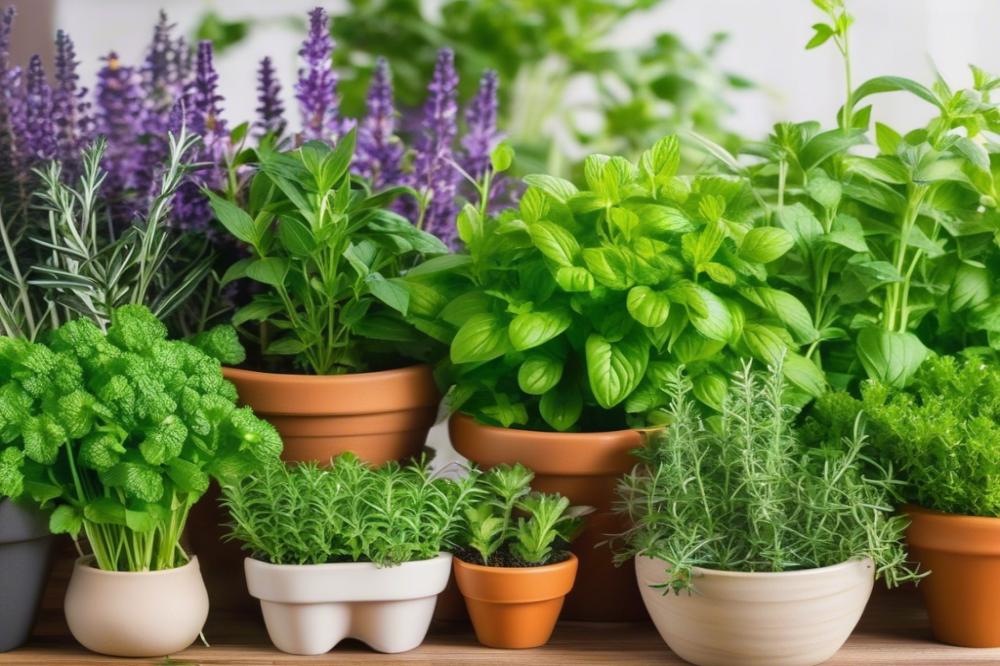Starting Your Own herbs-to-grow-for-beginners”>herb garden at Home
Creating an herbs-to-grow-for-beginners”>herb garden brings joy and flavor to your home. Many people find themselves drawn to the idea of growing their own plants. The importance of having an herb garden is clear. Fresh herbs can elevate everyday meals, making them more flavorful and colorful. Additionally, these plants provide a sense of achievement as you watch them grow, reinforcing the rewards of home gardening.
Growing your own herbs offers numerous benefits. Not only can you save money, but you also gain access to organic herbs free from harmful pesticides. Seeing your plants thrive can be incredibly satisfying. Thus, indoor gardening becomes a wonderful hobby that can assist in enhancing your cooking while promoting a healthier lifestyle. You will appreciate the difference between store-bought herbs and those freshly picked from your own collection.
This article will guide you through the essential steps needed to start your journey. Topics will include tips on garden planning, choosing the right plants, and utilizing appropriate gardening tools. You will also learn about container gardening if space is limited. Lastly, proper herb care techniques will ensure that your plants flourish and provide a bountiful supply throughout the seasons. Prepare to explore the delightful world of herbs and transform your culinary experiences.
Understanding Herbs
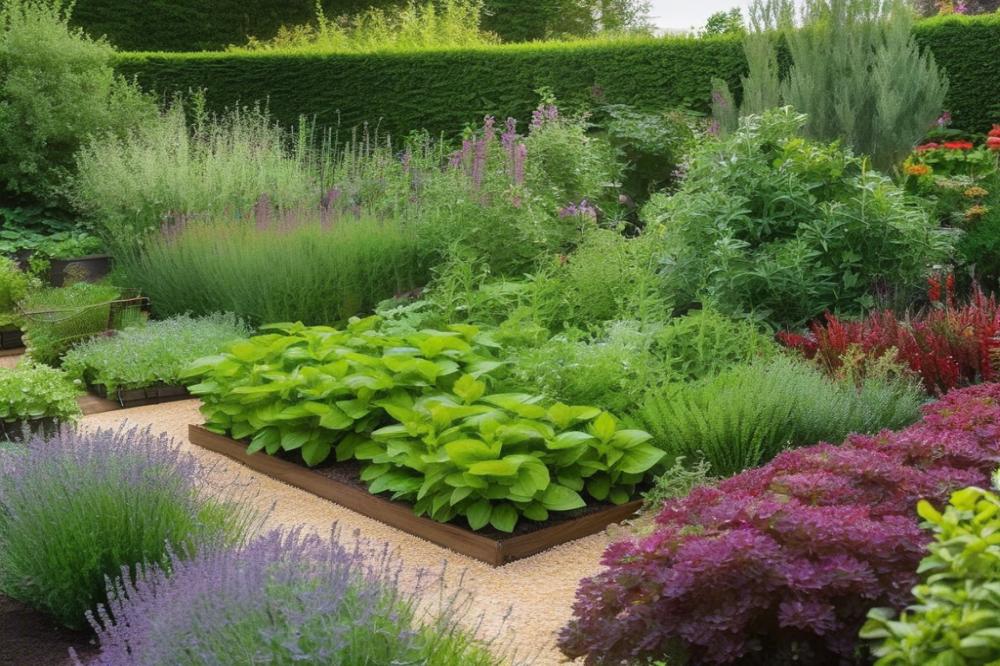

Common Culinary Herbs to Grow
Many people enjoy cooking with fresh herbs. Basil, for example, is a flavorful addition to salads and sauces. Chives offer a mild onion flavor that works well in various dishes. Oregano is great for Italian cuisine, adding depth to pasta and pizza. Parsley can brighten up any plate. These easy-to-grow plants don’t require much space, making them perfect for those interested in indoor gardening or container gardening. Use appropriate gardening tools to manage their growth effectively. Regular pruning encourages bushier plants and more abundant harvests.
Medicinal Herbs and Their Uses
Herbs aren’t just for cooking. Many plants have medicinal properties as well. For instance, peppermint is known to help with digestion and relieve headaches. Lavender can soothe anxiety and promote relaxation. Chamomile is often used as a tea to aid sleep and ease stress. Knowing these uses can enrich your gardening experience. Planning a garden with both culinary and medicinal herbs can enhance your overall well-being. Always consider proper herb care to maximize their benefits.
Organic Herbs vs. Conventional Herbs
When choosing herbs to grow, you might wonder about the difference between organic and conventional types. Organic herbs are grown without synthetic pesticides and fertilizers. This approach can lead to healthier plants and a safer product for your meals. Conventional growing methods might involve chemicals that some people prefer to avoid. gardening tips suggest that organic herbs also tend to have richer flavors. Growing organic varieties can be rewarding if you’re conscious about your health and environmental impact.
Experimenting with different growing methods can make gardening enjoyable. Understanding these aspects of herbs will empower you as you embark on your gardening adventure.
Garden Planning
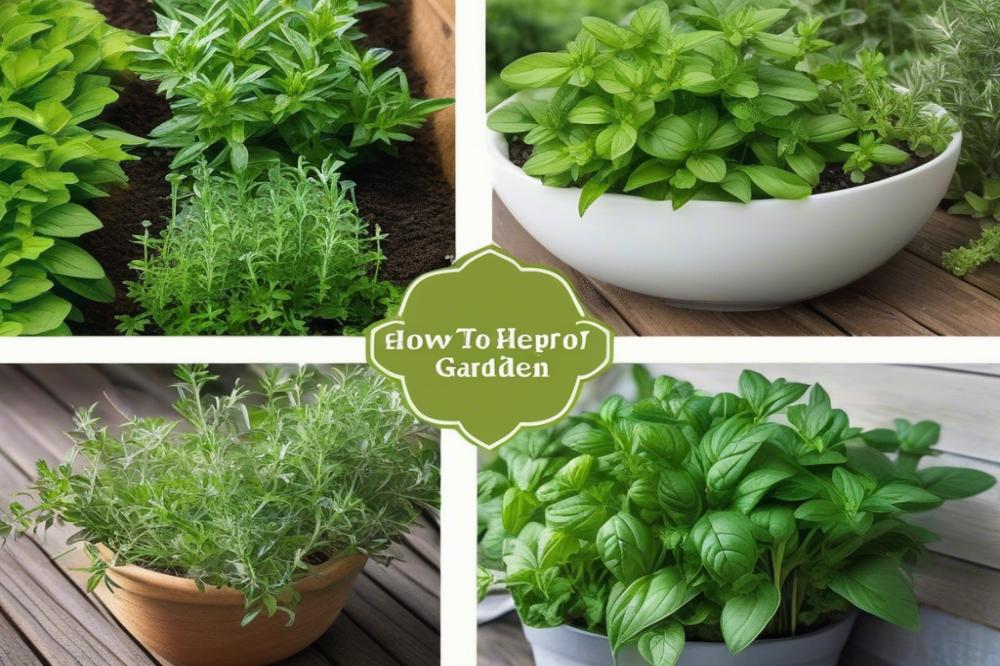

Choosing the right location for your herb garden is crucial. Look for a spot that gets sunlight for most of the day. Herbs like basil and rosemary thrive in bright light. Some herbs can tolerate shade, but they may not grow as vigorously. Observe your outdoor space or windows if you prefer indoor gardening.
Sunlight requirements vary for different herbs. For example, parsley and mint can manage with less light, while cilantro loves full sun. Knowing what each plant needs helps you position them correctly. It’s important to think about the changing seasons; the sun’s position shifts throughout the year.
Deciding between indoor or outdoor gardening is a personal choice. Indoor gardening allows for year-round growing opportunities. On the other hand, outdoor gardening connects you with nature and often provides better air circulation. Consider your space limits and the climate of your region when making this choice.
Planning your herb garden layout can enhance your growing experience. Group herbs with similar needs together to simplify care. If you’re using containers for gardening, choose pots with good drainage. Arrange taller plants in the back and shorter ones in front to maximize space. Creating a visually appealing layout can also make harvesting easier. Remember to keep in mind the tools you’ll need for maintenance as well.
Selecting the Right Plants
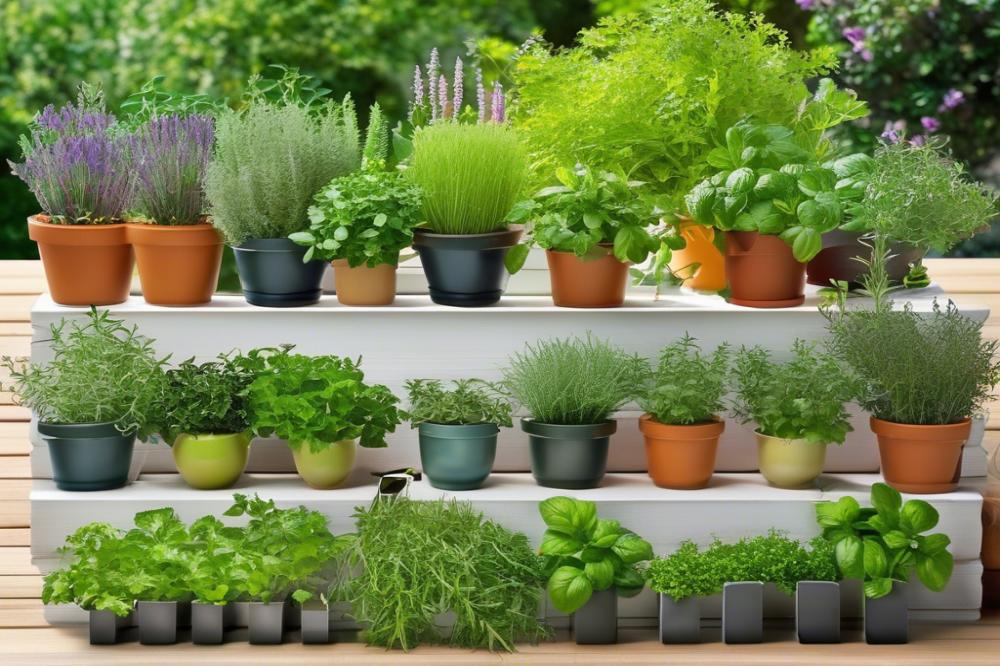

Choosing the right herbs for your garden starts with personal taste. Consider what you frequently cook. Popular options include basil, parsley, and cilantro. These herbs add flavor to many dishes. If you love pizza, oregano and thyme can be good choices. Experiment with different types to find your favorites.
Growing Companion Plants Alongside Herbs
Certain plants work well together. Companion planting can enhance growth and deter pests. For instance, basil grows nicely with tomatoes. It can improve their flavor while keeping harmful insects away. Marigolds are also great companions. They attract beneficial bugs that can protect your herbs. Think about adding these pairings during your garden planning to reap the benefits.
Seeds vs. Starter Plants
When starting your herb garden, you can choose between seeds or starter plants. Seeds offer the joy of watching plants grow from scratch. They can often be more cost-effective. However, germination requires care and patience. Starter plants provide a quicker way to see results. They come in pots, ready to be placed in your indoor gardening setup or outdoor garden. Consider your schedule and comfort level before making a choice. Both methods have their advantages, so select what works best for you.
Container Gardening
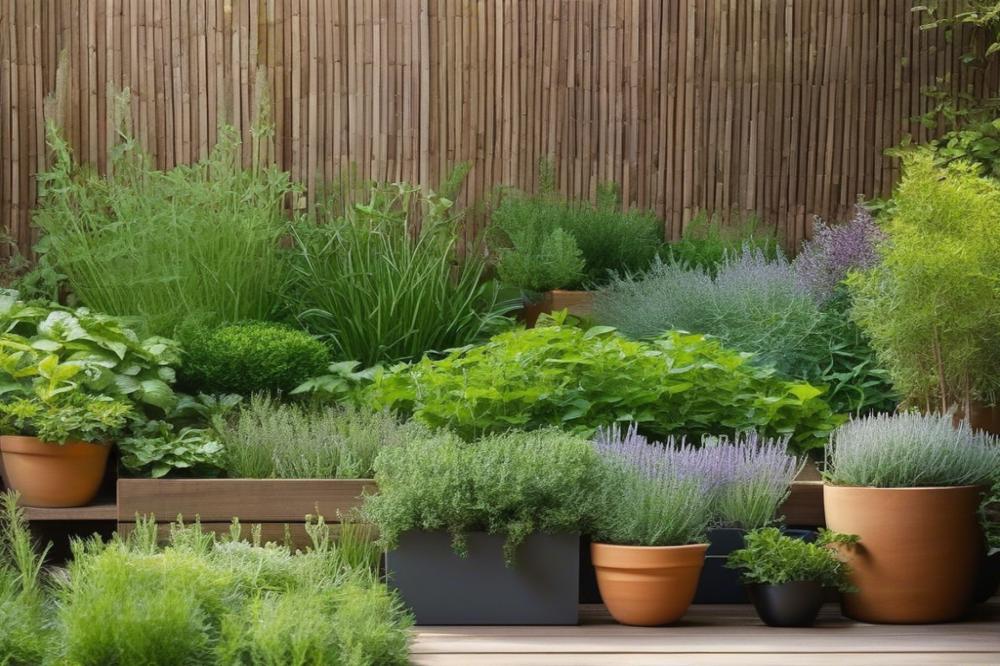

Benefits of Container Gardening for Herbs
Container gardening is an excellent option for growing herbs, especially for those with limited space. Such an approach allows individuals to control the environment of the plants more easily. Indoor gardening can be done without the constraints of a traditional garden. This method also gives flexibility in terms of location, making it easy to move the containers based on light availability. Many people find that caring for plants in containers is less intimidating. Each herb benefits from the concentrated space and tailored care provided in pots.
Types of Containers Suitable for Growing Herbs
Various containers can be used effectively for herb cultivation. Classic terracotta pots are popular and allow for good airflow to the roots. Plastic containers are lightweight and come in multiple colors, adding a decorative touch. Metal planters offer a rustic appeal but can heat up quickly under sunlight. Self-watering pots are another option, providing moisture consistently to the herbs. It is essential to choose a size that accommodates the plant’s growth; some plants need more space than others.
Soil Requirements and Drainage Tips
Soil is crucial for healthy plant growth. To grow herbs successfully, a well-draining potting mix is ideal. Consider a mix designed specifically for container gardening, which often contains materials that improve drainage. Adding perlite or sand can enhance aeration. Drainage holes at the bottom of containers are vital; these prevent water from accumulating and causing root rot. It is wise to check the moisture level frequently. Testing with the finger method—by sticking a finger into the soil—can help determine if it’s time to water. For those using organic herbs, make sure to choose organic soil to maintain the integrity of your plants. Keep these gardening tips in mind, and achieving a thriving herb garden will be much more attainable.
Gathering Gardening Tools
Essential Tools for Starting Your Herb Garden
Starting your gardening journey requires the right tools. A trowel is essential for digging and planting. Pruning shears will help you trim and shape your plants. Don’t forget a watering can to keep your herbs hydrated. A pair of gardening gloves protects your hands while working with soil. Consider using plant labels to organize your herbs. These tools lay the foundation for successful growing.
Optional Tools That Can Enhance Your Gardening Experience
Some tools, while not strictly necessary, can make gardening easier or more enjoyable. A garden fork is great for turning soil. It can help aerate the ground and mix in compost. A hand rake can smooth out your planting area. For those interested in indoor gardening, a grow light can support growth when sunlight is limited. Using a soil moisture meter can take the guesswork out of watering. These extras might just elevate your gardening experience.
Where to Purchase Gardening Supplies
Finding gardening supplies is easier than ever. Local garden centers often offer a variety of tools, plants, and soil. Big box stores may also carry what you need at competitive prices. Online retailers provide the convenience of shopping from home, plus customer reviews can guide your choices. Check for local farmer’s markets, where you might discover organic herbs. Always look for high-quality materials to ensure your gardening journey starts on the right foot.
Growing Herbs
Step-by-step guide to planting herbs
Planting herbs can be a rewarding experience. Start by choosing the right pots or containers if you are considering indoor gardening. Select each plant according to its needs, making sure to pick herbs that grow well together. Once you have chosen your containers, fill them with a quality potting mix. This soil should be light and well-draining. Consider adding some perlite or sand for extra drainage.
Now it’s time to plant your seeds or seedlings. Follow the package instructions regarding depth and spacing. After planting, gently firm the soil around the seedlings. Water lightly to moisten the soil, but avoid over-saturating. Place your containers where they can receive at least six hours of sunlight each day. If you have limited space, consider vertical gardening techniques or shelf units to maximize light exposure.
Watering requirements and tips
Watering is crucial for herb care. Generally, herbs prefer slightly moist soil but dislike sitting in water. Allow the top inch of soil to dry between watering. This helps to prevent root rot and keeps your plants healthy. Pay attention to your herbs each day. Overwatering can be as harmful as underwatering. A good gardening tip is to use your finger to check the moisture level. If the soil feels dry, it’s time to water.
In hot weather, your herbs may need more frequent watering. Morning is the best time for this task, as it allows plants to absorb moisture before the heat of the day. Use a watering can with a spout for more control. This reduces the risk of damaging delicate leaves or displacing soil. Avoid wetting the foliage directly, as this can lead to fungal diseases.
Essential nutrients and organic fertilizers
When growing herbs, providing essential nutrients is vital. Herbs thrive on a balanced diet. Organic fertilizers are a great choice for maintaining soil health. They are effective and support environmentally safe gardening practices. Look for options such as compost, fish emulsion, or worm castings to enrich the soil.
Applying fertilizer usually happens every four to six weeks during the growing season. Dilute the organic fertilizers according to the instructions. This helps to avoid over-fertilizing and harming the plants. Remember, herbs typically do not require as much fertilization as other garden plants. Good garden planning can help balance nutrient needs without overwhelming your herbs.
Keep an eye out for any signs of nutrient deficiency. Yellowing leaves may indicate a lack of nitrogen, while pale leaves can signal a lack of iron. The right balance will lead to healthier plants and better flavors in your culinary creations.
Herb Care and Maintenance
Pruning and Harvesting Tips
Keeping your herbs healthy requires regular pruning. Snipping off the tips encourages bushy growth. Use sharp scissors or gardening tools to make clean cuts. It’s ideal to prune before the plants flower. Harvest herbs in the morning when the oils are most potent. Always take only a third of the plant at a time to allow for regrowth. After harvesting, wash the herbs gently and dry them to preserve their flavor. Regular trimming can also help you manage the size of the plants. By maintaining a consistent routine, your herbs will thrive.
Pest Control and Disease Management
Pests can be a common issue in both indoor and container gardening. Inspect plants regularly for signs of trouble, such as discolored leaves or bugs. Organic herbs can attract beneficial insects that help control pests. Introducing ladybugs or using insecticidal soap can protect your plants naturally. For soil-related diseases, make sure your pots have proper drainage. Overwatering can lead to root rot. Keeping your workspace clean also reduces the risk of disease spreading. Observe your herbs closely, as early detection is critical for effective management.
Seasonal Care for Indoor vs. Outdoor Herbs
Seasons can greatly affect how you care for your plants. Indoor gardening requires different attention than outdoor gardening. During the winter months, make sure indoor herbs get plenty of light. A south-facing window can provide optimal sunlight. Water them less frequently, as indoor air tends to be drier. Outdoor herbs can benefit from mulching in the summer to retain moisture. Feed them with organic fertilizers to promote healthy growth in the warmer months. Knowing your local climate also aids in proper garden planning. Adapting to seasonal changes helps ensure your herbs flourish year-round.
Your Journey to Growing Fresh Herbs at Home
Recapping the benefits of creating your own herb garden brings to light several positive aspects. Fresh herbs add flavor and nutrition to meals. They also promote a healthier lifestyle by encouraging home-cooking. Watching plants grow provides a soothing experience that many find rewarding. Additionally, this hobby can save you money on grocery bills. Growing your own herbs allows you to have organic options right on your doorstep.
Starting to cultivate your own herbs can be an exciting adventure. Each step taken is a pathway to learning and discovery. With a little patience and care, anyone can succeed. Why not consider trying your hand at this fulfilling endeavor? Even if you only have a small space, small containers are perfect for herb gardening.
Thoughts on the enjoyment of nurturing plants run deep. Each day spent tending to your herbal plants brings a unique satisfaction. The beauty of seeing seeds sprout and leaves flourish is unmatched. Gardening offers a connection to nature that can brighten even the busiest days. As you embrace this new project, consider exploring additional gardening tips to make your experience even better.
Take the first step today. The joy of growing your own herbs awaits you.

